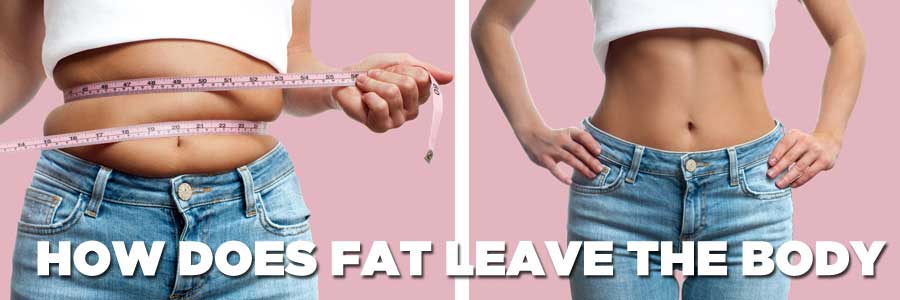How Does Fat Leave the Body?

[updated September 2019]
If you’ve recently joined a weight loss program to help you lose weight, you may be wondering how fat leaves the body once you start losing weight. Weight loss is achieved through a combination of a healthy exercise and a healthy diet plan that focuses on lean protein, healthy fats, and carbohydrates from fruits and vegetables. This combination aids the body in burning stored fat for fuel and energy and preventing the body from storing excess fat that you continue to consume.
But what happens to body fat when you shed pounds – do you sweat it out, pee it out or breathe it out?
How Fat Leaves the Body When You Lose Weight
Watch this video for more information about what happens to the fat that is burned off when you lose weight. To keep it simple, as your body burns up excess fat to create fuel after joining a weight loss program, you then breathe it out as carbon dioxide or expel it through your sweat, urine, tears, and feces.
Fat is basically stored energy. And your body uses energy in more ways than you’d think.
- When you are resting your heart needs the energy to pump your lungs to breathe and your brain to think. This is your basal metabolism.
- When you’re active your muscles need energy. This means anything from getting up from a chair to running marathon.
- When you’re eating your digestive system needs the energy to break down and store food.
When you diet, you take in fewer calories than your body needs. Due to the deficit, your body turns to fat reserves for energy. During the fat burning process, the body converts fat into usable energy for your muscles and other tissues causing the fat cell to shrink.
When you exercise, your muscles first burn through stored glycogen for energy. Typically, after 30-60 minutes of aerobic exercise, your body has burned through the stored glycogen and starts burning mainly fat.
Most of us really don’t think about where fat goes when we lose it. In all honesty, we’re just happy that the scale says it’s gone and our clothes fit better. But the fat doesn’t magically disappear when your body starts to burn fat.
Research shows that 84% of fat loss is exhaled as carbon dioxide. The remaining 16% of fat is excreted as water. During the conversion of energy, carbon dioxide, and water are byproducts of waste. They are excreted via urine, perspiration, and exhalation. Interestingly, research reveals the lungs as the primary organ used to remove from the body.
Key to Losing Fat
According to physicist Ruben Meerman, who has done extensive research in fat metabolism that was published in the British Medical Journal in 2014, calculations show that the lungs are the primary excretory organ for fat. Losing weight requires unlocking the carbon stored in fat cells thus reinforcing the often-heard refrain of “eat less, move more.”

About the Author – Suzanne Gil, M.D.
Dr. Suzanne Gil obtained advanced training in bariatrics (weight loss medicine) and opened Calla Slimspa Medical Weight Loss Center located in Orlando, FL in 2008 when the need for weight-related assistance became a huge priority. She is a member of the American Society of Bariatric Physicians (ASBP) and dedicates 100% of her professional time to helping as many people as possible achieve their weight loss goals and improve their health. She completed her residency at Orlando Regional Medical Center and is a Board Certified Pediatrician.
